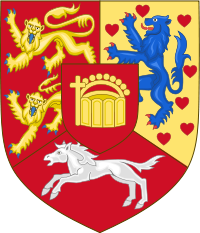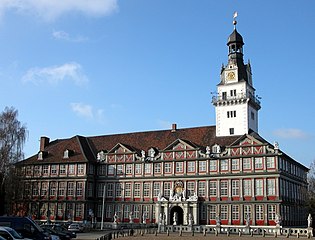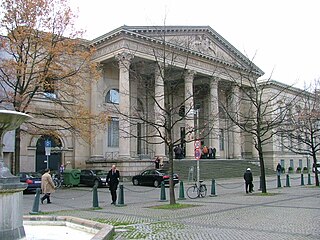House of Hanover
| House of Hanover | |
|---|---|
 Arms of the House of Hanover | |
 | |
| Parent house | Bonifaci → Obertenghi → Este → Welf |
| Country |
|
| Etymology | Ernst August, Prince of Hanover |
| Titles | List
|
| Deposition |
|
The House of Hanover (
The formal name of the house was the House of Brunswick-Lüneburg, Hanover line.
History
Dukes and Electors of Brunswick-Lüneburg
- George, Duke of Brunswick-Lüneburg, first member of the House of Hanover.
- Christian Louis, 1st son of Duke George, Prince of Calenberg (1641–1648) and Prince of Lüneburg (1648–1665). He relinquished Calenburg when he became Prince of Lüneburg.
- George William, 2nd son of Duke George, Prince of Calenberg (1648–1665) and Prince of Lüneburg (1665–1705). He relinquished Calenburg when he became Prince of Lüneburg on the death of his brother, Christian Louis.
- John Frederick, 3rd son of Duke George, Prince of Calenberg (1665–1679).
- James I of England.
- George Louis, son of Duke Ernest Augustus and Sophia, became Elector and Prince of Calenberg in 1698 and Prince of Lüneburg when his uncle George William died in 1705. He inherited his mother's claim to the throne of Great Britain when she died in 1714.
Monarchs of Great Britain, Ireland, and Hanover

George Louis became the first British monarch of the House of Hanover as George I in 1714.[3]: 13 The dynasty provided six British monarchs:
Of the Kingdoms of Great Britain and Ireland (changed in 1801 to the United Kingdom of Great Britain and Ireland):[note 1]
- George I (r. 1714–1727) (Georg Ludwig = George Louis)
- George II (r. 1727–1760) (Georg August = George Augustus)
- George III(r. 1760–1820)
- George IV(r. 1820–1830)
- William IV(r. 1830–1837)
- Victoria (r. 1837–1901).
George I, George II, and George III also served as electors and dukes of
Upon the death of William IV in 1837, the
After end of personal union

After the death of William IV in 1837, the following kings of Hanover continued the dynasty:
- Ernest Augustus, King of Hanover (r. 1837–1851)
- George V (r. 1851–1866, deposed)
The
Prince-bishops of Osnabrück
At the end of the Thirty Years' War, the Peace of Westphalia (1648) awarded the Prince-Bishopric of Osnabrück alternately to a Catholic bishop and to a cadet branch of Brunswick-Lüneburg.[4] Since the treaty gave cadets priority over heirs and reigning princes, Osnabrück became a form of appanage (in alternation) of the House of Hanover.
- George, Duke of Brunswick-Lüneburg
- Ernest Augustus, Elector of Brunswick-Lüneburg
- George III
Osnabrück was
Dukes of Brunswick


In 1884, the senior branch of the
The Duke of Cumberland proclaimed himself Duke of Brunswick at the Duke's death, and lengthy negotiations ensued but were never resolved.
After having left
Claimants
The later heads of the House of Hanover have been:
- George V (1866–1878)
- Ernest Augustus, Crown Prince of Hanover, 3rd Duke of Cumberland and Teviotdale (1878–1923)
- Ernest Augustus, Duke of Brunswick (1923–1953), son of the previous
- Ernest Augustus, Prince of Hanover(1953–1987)
- Ernest Augustus, Prince of Hanover(1987–present)
The family has been resident in Austria since 1866 and thus took on Austrian nationality besides their German and British. Since the later king
On 29 August 1931,
Members
Patrilineal descent
- Oberto I, 912–975
- Oberto Obizzo, 940–1017
- Albert Azzo I, Margrave of Milan, 970–1029
- Albert Azzo II, Margrave of Milan, died 1097
- Welf I, Duke of Bavaria, 1037–1101
- Henry IX, Duke of Bavaria, 1074–1126
- Henry X, Duke of Bavaria, 1108–1139
- Henry the Lion, 1129–1195
- William of Winchester, Lord of Lunenburg, 1184–1213
- Otto I, Duke of Brunswick-Lüneburg, 1204–1252
- Albert I, Duke of Brunswick-Lüneburg, 1236–1279
- Albert II, Duke of Brunswick-Lüneburg, 1268–1318
- Magnus the Pious, Duke of Brunswick-Lüneburg, 1304–1369
- Magnus II, Duke of Brunswick-Lüneburg, 1328–1373
- Bernard I, Duke of Brunswick-Lüneburg, 1362–1434
- Frederick II, Duke of Brunswick-Lüneburg, 1408–1478
- Otto V, Duke of Brunswick-Lüneburg, 1439–1471
- Heinrich, Duke of Brunswick-Lüneburg, 1468–1532
- Ernest I, Duke of Brunswick-Lüneburg, 1497–1546
- William, Duke of Brunswick-Lüneburg, 1535–1592
- George, Duke of Brunswick-Lüneburg, 1582–1641
- Ernest Augustus, Elector of Hanover, 1629–1698
- George I of Great Britain, 1660–1727
- George II of Great Britain, 1683–1760
- Frederick, Prince of Wales, 1707–1751
- George III of the United Kingdom, 1738–1820
- Ernest Augustus, King of Hanover, 1771–1851
- George V of Hanover, 1819–1878
- Ernest Augustus, Crown Prince of Hanover, 1845–1923
- Ernest Augustus, Duke of Brunswick, 1887–1953
- Ernest Augustus, Prince of Hanover, 1914–1987
- Ernst August, Prince of Hanover, b. 1954
- Prince Ernest Augustus of Hanover, b. 1983
Family tree
| House of Hanover family tree | |||||||||||||||||||||||||||||||||||||||||||||||||||||||||||||||||||||||||||||||||||||||||||||||||||||||||||||||||||||||||||||||||||||||||||||||||||||||||||||||||||||||||||||||||||||||||||||||||||||||||||||||||||||||||||||||||||||||||||||||||||||||||||||||||||||||||||||||||||||||||||||||||||||||||||||||||||||||||||||||||||||||||||||||||||||||||||||||||||||||||||||||||||||||||||||||||||||||||||||||||||||||||||||||||||||||||||||||||||||||||||||||||||||||||||||||||||||||||||||||||||||||||||||||||||||||||||||||||||||||||||||||||||||||||||||||||||||||||||||||||||||||||||||||||||||||||||||||||||||||||||||||||||||||||||||||||||||||||||||||||||||||||||||||||||||||||||||||||||||||||||||||||||||||||||||||||||||||||||||||||||||||||||||||||||||||||||||||||||||||||||||||||||||||||||||||||||||||||||||||||||||||||||||||||||||||||||||||||||||||||||||||||||||||||||||||||||||||||||||||||||||||||||||||||||||||||||||||||||||||||||||||||||||||||||||||||||||||||||||||||||||||||||||||||||||||||||||||||||||||
|---|---|---|---|---|---|---|---|---|---|---|---|---|---|---|---|---|---|---|---|---|---|---|---|---|---|---|---|---|---|---|---|---|---|---|---|---|---|---|---|---|---|---|---|---|---|---|---|---|---|---|---|---|---|---|---|---|---|---|---|---|---|---|---|---|---|---|---|---|---|---|---|---|---|---|---|---|---|---|---|---|---|---|---|---|---|---|---|---|---|---|---|---|---|---|---|---|---|---|---|---|---|---|---|---|---|---|---|---|---|---|---|---|---|---|---|---|---|---|---|---|---|---|---|---|---|---|---|---|---|---|---|---|---|---|---|---|---|---|---|---|---|---|---|---|---|---|---|---|---|---|---|---|---|---|---|---|---|---|---|---|---|---|---|---|---|---|---|---|---|---|---|---|---|---|---|---|---|---|---|---|---|---|---|---|---|---|---|---|---|---|---|---|---|---|---|---|---|---|---|---|---|---|---|---|---|---|---|---|---|---|---|---|---|---|---|---|---|---|---|---|---|---|---|---|---|---|---|---|---|---|---|---|---|---|---|---|---|---|---|---|---|---|---|---|---|---|---|---|---|---|---|---|---|---|---|---|---|---|---|---|---|---|---|---|---|---|---|---|---|---|---|---|---|---|---|---|---|---|---|---|---|---|---|---|---|---|---|---|---|---|---|---|---|---|---|---|---|---|---|---|---|---|---|---|---|---|---|---|---|---|---|---|---|---|---|---|---|---|---|---|---|---|---|---|---|---|---|---|---|---|---|---|---|---|---|---|---|---|---|---|---|---|---|---|---|---|---|---|---|---|---|---|---|---|---|---|---|---|---|---|---|---|---|---|---|---|---|---|---|---|---|---|---|---|---|---|---|---|---|---|---|---|---|---|---|---|---|---|---|---|---|---|---|---|---|---|---|---|---|---|---|---|---|---|---|---|---|---|---|---|---|---|---|---|---|---|---|---|---|---|---|---|---|---|---|---|---|---|---|---|---|---|---|---|---|---|---|---|---|---|---|---|---|---|---|---|---|---|---|---|---|---|---|---|---|---|---|---|---|---|---|---|---|---|---|---|---|---|---|---|---|---|---|---|---|---|---|---|---|---|---|---|---|---|---|---|---|---|---|---|---|---|---|---|---|---|---|---|---|---|---|---|---|---|---|---|---|---|---|---|---|---|---|---|---|---|---|---|---|---|---|---|---|---|---|---|---|---|---|---|---|---|---|---|---|---|---|---|---|---|---|---|---|---|---|---|---|---|---|---|---|---|---|---|---|---|---|---|---|---|---|---|---|---|---|---|---|---|---|---|---|---|---|---|---|---|---|---|---|---|---|---|---|---|---|---|---|---|---|---|---|---|---|---|---|---|---|---|---|---|---|---|---|---|---|---|---|---|---|---|---|---|---|---|---|---|---|---|---|---|---|---|---|---|---|---|---|---|---|---|---|---|---|---|---|---|---|---|---|---|---|---|---|---|---|---|---|---|---|---|---|---|---|---|---|---|---|---|---|---|---|---|---|---|---|---|---|---|---|---|---|---|---|---|---|---|---|---|---|---|---|---|---|---|---|---|---|---|---|---|---|---|---|---|---|---|---|---|---|---|---|---|---|---|---|---|---|---|---|---|---|---|---|---|---|---|---|---|---|---|---|---|---|---|---|---|---|---|---|---|---|---|---|---|---|---|---|---|---|---|---|---|---|---|---|---|---|---|---|---|---|---|---|---|---|---|---|---|---|---|---|---|---|---|---|---|---|---|---|---|---|---|---|---|---|---|---|---|---|---|---|---|---|---|---|---|---|---|---|---|---|---|---|---|---|---|---|---|---|---|---|---|---|---|---|---|---|---|---|---|---|---|---|---|---|---|---|---|---|---|---|---|---|---|---|---|---|---|---|---|---|---|---|---|---|---|---|---|---|---|---|---|---|---|---|---|---|---|---|---|---|---|---|---|---|---|---|---|---|---|---|---|---|---|---|---|---|---|---|---|---|---|---|---|---|---|---|---|---|---|---|---|---|---|---|---|---|---|---|---|---|---|---|---|---|---|---|---|---|---|---|---|---|---|---|---|---|---|---|---|---|---|---|---|---|---|---|---|---|---|---|---|---|---|---|---|---|---|---|---|---|---|---|---|---|---|---|---|---|---|---|---|---|---|---|---|---|---|---|---|---|---|---|---|---|---|---|---|---|---|---|---|---|---|---|---|---|---|---|---|---|---|---|---|---|---|---|---|---|---|---|---|---|---|---|---|---|---|---|---|---|---|---|---|---|---|---|---|---|
|
House of Brunswick-Lüneburg, Hanover line
Key: : The red border indicates leaders of the House : The bold black border indicates children of leaders : The thin black border indicates other relatives
| |||||||||||||||||||||||||||||||||||||||||||||||||||||||||||||||||||||||||||||||||||||||||||||||||||||||||||||||||||||||||||||||||||||||||||||||||||||||||||||||||||||||||||||||||||||||||||||||||||||||||||||||||||||||||||||||||||||||||||||||||||||||||||||||||||||||||||||||||||||||||||||||||||||||||||||||||||||||||||||||||||||||||||||||||||||||||||||||||||||||||||||||||||||||||||||||||||||||||||||||||||||||||||||||||||||||||||||||||||||||||||||||||||||||||||||||||||||||||||||||||||||||||||||||||||||||||||||||||||||||||||||||||||||||||||||||||||||||||||||||||||||||||||||||||||||||||||||||||||||||||||||||||||||||||||||||||||||||||||||||||||||||||||||||||||||||||||||||||||||||||||||||||||||||||||||||||||||||||||||||||||||||||||||||||||||||||||||||||||||||||||||||||||||||||||||||||||||||||||||||||||||||||||||||||||||||||||||||||||||||||||||||||||||||||||||||||||||||||||||||||||||||||||||||||||||||||||||||||||||||||||||||||||||||||||||||||||||||||||||||||||||||||||||||||||||||||||||||||||||||
Legacy
Many towns and provinces across the
-
Wolfenbüttel Castle
-
The Leine Palace in Hanover (Former Royal Residence of the Kingdom of Hanover)
-
HerrenhausenPalace and Gardens in Hanover (c. 1708)
-
Marienburg Castle (Hanover), present seat of the Princes of Hanover
See also
- Hanoverian prince for family tree
- Georgian era for kings George I, II, III, IV
- History of Hanover
- Kingdom of Hanover
- Personal union of Great Britain and Hanover
- German Chancery
Notes
- ^ In 1801, the British and Irish kingdoms merged, forming the United Kingdom of Great Britain and Ireland.
- ^ Privately however the British Royal Family (of the House of Saxe-Coburg and Gotha, alias House of Windsor) continued to call their German branch the Cumberlands, for instance when Edward VIII described his visit to the family in Gmunden in a letter to his mother in 1937.
- ^ In 1919 royalty and nobility lost their privileges as such in Germany, hereditary titles thereafter being legally retained only as part of the surname, according to Article 109 the Weimar Constitution.
References
- ^ "Royal Arms of Britain". Heraldica. Archived from the original on 6 December 2008. Retrieved 10 May 2016.
The House of Brunswick Luneburg being one of the most illustrious and most ancient in Europe, the Hanoverian branch having filled for more than a century one of the most distinguished thrones, its possessions being among the most considerable in Germany;
- ISBN 9780719057694.: 195
- ^ ISBN 1-84018-631-3..
- ISBN 9780720614237.
According to the Peace of Westphalia, the See of Osnabrück was to be held alternately by a Catholic and a Protestant incumbent; the Protestant bishop was to be a younger son of the Brunswick-Lüneburg family.
- ISBN 978-0-13-514653-8.
- ^ "In der Prinzenrolle". HAZ – Hannoversche Allgemeine. Archived from the original on 31 August 2019. Retrieved 22 January 2018.
- ^ Ernst August (geb.1954) Prinz von Hannover Archived 21 January 2021 at the Wayback Machine at welfen.de (in German)
- ^ Attorney-General v HRH Prince Ernest Augustus of Hanover [1957] 1 All ER 49
Further reading
- Black, Jeremy (2003). "Georges I & II: Limited monarchs". History Today. 53 (2): 11+.
- Black, Jeremy (2004). The Hanoverians: The History of a Dynasty.
- Fraser, Flora. (2005). Princesses: The Six Daughters of George III. Knopf.
- Plumb, J. H. (1974). The First Four Georges (Revised ed.). Hamlyn.
- Redman, Alvin (1960). The House of Hanover. Coward-McCann.
- Robertson, Charles (1911). England under the Hanoverians.
- Schweizer, Karl W.; Black, Jeremy (1989). Politics and the Press in Hanoverian Britain. E. Mellon Press.
- Simms, Brendan; Riotte, Torsten, eds. (2009). The Hanoverian Dimension in British History, 1714–1837. Cambridge University Press. ISBN 9780511496936.
- Thackeray, William M.(1861). The Four Georges: Sketches of Manners, Morals, Court, and Town Life. Smith, Elder & Co.
- Van der Kiste, John (1992). George III's Children. Sutton Publishing.
Historiography
- Bultmann, William A. "Early Hanoverian England (1714–1760): Some Recent Writings," in Elizabeth Chapin Furber, ed. Changing views on British history: essays on historical writing since 1939 (Harvard University Press, 1966), pp 181–205
- O’Gorman, Frank (1986). "The Recent Historiography of the Hanoverian Regime". S2CID 159984575.
- Snyder, Henry L. "Early Georgian England," in Richard Schlatter, ed., Recent Views on British History: Essays on Historical Writing since 1966 (Rutgers UP, 1984), pp. 167–196, historiography












